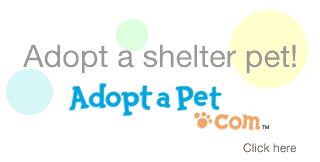Here are some good housetraining tips that I thought I would pass on. –Kim
House Training Your Puppy or Adult Dog
 House training a puppy or adult dog is such an essential issue for his owner that even a single exclusive tip turns out to be extremely helpful.
House training a puppy or adult dog is such an essential issue for his owner that even a single exclusive tip turns out to be extremely helpful.
The first step in making your dog fit for polite company would be to potty train him. Some see this training as a hassle and some as a challenge.
For me, it is part of bringing up a pet.
There are a few things you need to know before you actually start potty training a puppy or adult dog. I enumerate these below:
- You need to understand your dog's body language. Watch for signs that will indicate to you when your pet wants to eliminate.
- If you own puppies, remember that they need to go potty at fairly frequent intervals – as soon as they wake up, after short naps, after play-time, after meals, before and after being crated and finally, before retiring for the night.
- Take your dog for walks at the time that he usually does his potty. Take him out to the yard, and then, to the same place there every time he needs to answer nature's call.
- Praise your dog after he eliminates at the right place. Some dog owners even give treats to their dogs. But remember to do this every time he does it right. He will relate the rewards to his having "done it right" and zero in on the spot where you want him to defecate regularly.
- With time, you can try signal training. This is so that you know when your doggie wants to go. You can hang a bell at his level near the door and teach him to push it with his nose or pat it with his paw on his way out.
- Until your dog has been fully potty trained, keep him under strict vigilance. Do not let him roam around the house freely.
- Use a crate. A crate-trained dog is usually very happy to get his own den. The advantage of crating is that dogs do not soil the place where they sleep. So, he will naturally not eliminate inside the crate.
- If you have a small dog and if you live in a high-rise building or in a place that does not have a proper backyard, you can try litter pan training. This means to create a space for your pet to eliminate in your house itself.
- Use positive reinforcements while housebreaking puppies or adult dogs. Do not scold or hit him, as you will gain nothing by doing that. He will only associate punishment with your return from outside. If you catch him in the act, a stern 'NO' or 'FREEZE' will do (but be consistent). It will startle the dog enough for him to stop pooping.
- Be prepared to return to a soiled home if you are keeping your dog home alone for more than 4 hours, as separation anxiety is quite common among home-alone dogs.
- Accidents will happen. It is unusual for a trained adult dog to work against his house training. But medical problems or health disorders may lead to sudden accidents.
- Many dogs mark their territory. These can be a leg of a table or a particular wall. Intact male and female dogs mark their territories by urinating. Use deodorizers to spray on the places where your dog has marked.
- If you are patient and are ready to accept that house training a dog takes time, even months sometimes, you will end up having a good house-trained dog.
Now we will move on to how to potty train puppies and adult dogs.
Potty Training a Puppy
 Irrespective of breeds, house training a puppy is considered to be one of the biggest challenges by dog owners. If you think house training your puppy simply involves a steady supply of old newspapers or puppy pads, then think again.
Irrespective of breeds, house training a puppy is considered to be one of the biggest challenges by dog owners. If you think house training your puppy simply involves a steady supply of old newspapers or puppy pads, then think again.
A puppy does not develop full control over his bladder until he is over 4 or 5 months old. Since they are growing and developing rapidly at this time, puppies eat more, burn more calories and need to eliminate more frequently than an adult dog.
After each nap, meal, drink or playtime, take your puppy to his designated area (indoors or outdoors, wherever you have decided) and stay there until he eliminates. Then bring him to his crate.
Repeat this situation everyday until he has developed a habit out of it.
Potty Training an Adult Dog
The best way to house train an adult dog is to begin all over again.
Observe him very closely. Maybe even maintain a diary of where he goes and when. Whether he is pooping when you are home or only when you are outside; whether you can, time yourself to be home when he feels the need to go outside.
You can try dog crates, but be careful to introduce him gradually to them.
Remember: Commitment, consistency and intelligent use of positive reinforcement will make you the owner of a perfectly house-trained dog. Don't expect miracles. You will only be disappointed.
Get this unique house training guide and start house-breaking your dog today.
Copyright © 2009 TrainPetDog.com
This entry was posted
on Sunday, June 29, 2014
at Sunday, June 29, 2014
and is filed under
behavior,
books/CDs,
Dogs,
environment,
habits,
housetraining,
Information,
pee,
poop,
potty,
prevention,
puppies,
resources,
Top Dog Blog,
training,
urine
. You can follow any responses to this entry through the
comments feed
.




































